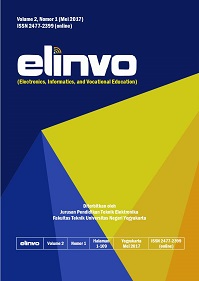Development and Validation of a TPACK Instrument for Preservice Teachers in the Faculty of Engineering UNY
DOI:
https://doi.org/10.21831/elinvo.v6i2.44301Keywords:
TPACK instrument, confirmatory factor analysis, preservice teachers, vocational high schoolsAbstract
It is crucial to assess teachers' competency using TPACK. Therefore, the objective of this study was to develop a TPACK instrument for preservice teachers in the Faculty of Engineering, Universitas Negeri Yogyakarta. This study designed the TPACK instrument through 4 stages, namely: (1) literature study to determine the construct and statement items, (2) expert judgment to meet content validity, (3) revision and refinement of items from the review results, (4 ) validity and reliability testing. The research sample consisted of 200 preservice teachers. Validity and reliability testing used Confirmatory Factor Analysis (CFA) with a SmartPLS software program. The results suggested that the instrument met convergent validity with a loading factor value > 0.4, which ranged from 0.802 to 0.932, and discriminant validity, which indicated that the factor loading value for each observed variable with each latent variable was higher than the factor loading value with other latent variables. Composite Reliability values ranged from 0.908 to 0.954, and Cronbach Alpha ranged from 0.867 to 0.936, indicating that the instrument was reliable. Thus this instrument was considered effective in measuring the TPACK of preservice teachers preparing to be productive teachers in vocational high schools.
References
_______, "Undang-Undang No 14 Tahun 2005 Tentang Guru dan Dosen." 2005.
L. S. Shulman, "Those Who Understand: A Conception of Teacher Knowledge.," Am. Educ., vol. 10, no. 1, pp. 4–14, 1986, [Online]. Available: http://www.eric.ed.gov/ERICWebPortal/recordDetail?accno=EJ333816%5Cnpapers3://publication/uuid/E77F7FFC-98B3-40B5-90D2-50050B024672
C. Fernandez, "Knowledge Base for Teaching and Pedagogical Content Knowledge (Pck): Some Useful Models and Implications for Teachers' Training," Probl. Educ. 21st Century, vol. 60, no. 1, pp. 79–100, 2014, doi: 10.33225/pec/14.60.79.
P. Mishra and M. J. Koehler, "Technological Pedagogical Content Knowledge: A Framework for Teacher Knowledge," Teach. Coll. Rec. Voice Scholarsh. Educ., vol. 108, no. 6, pp. 1017–1054, 2006, doi: 10.1177/016146810610800610.
C. S. Chai, E. M. W. Ng, W. Li, H. Y. Hong, and J. H. L. Koh, "Validating and modeling technological pedagogical content knowledge framework among asian preservice teachers," Australas. J. Educ. Technol., vol. 29, no. 1, pp. 41–53, 2013, doi: 10.14742/ajet.174.
S. Utami, "Meningkatkan Mutu Pendidikan Indonesia Melalui Peningkatan Kualitas Personal, Profesional, Dan Strategi Rekrutmen Guru," Pros. Semin. Nas. Pendidik. FKIP, vol. 2, no. 1, pp. 518–527, 2019.
H. Zulfitri, N. P. Setiawati, and I. Ismaini, "Pendidikan profesi guru (PPG) sebagai upaya meningkatkan profesionalisme guru," Ling. J. Bhs. dan Sastra, vol. 19, no. 2, pp. 130–136, 2019.
R. VANNATTA, B. BEYERBACH, and C. WALSH, "From teaching technology to using technology to enhance student learning: Preservice teachers' changing perceptions of technology infusion," J. Technol. Teach. Educ., vol. 9, no. 1, pp. 105–127, 2001.
M. J. Koehler, P. Mishra, M. Akcaoglu, and J. M. Rosenberg, "The Technological Pedagogical Content Knowledge Framework for Teachers and Teacher Educators," ICT Integr. Teach. mducation Model., pp. 1–8, 2013, [Online]. Available: http://cemca.org.in/ckfinder/userfiles/files/ICT teacher education Module 1 Final_May 20.pdf
D. Schmidt-Crawford, E. Baran, A. Thompson, P. Mishra, M. Koehler, and S. Seob, "Technological Pedagogical Content Knowledge (TPACK): The Development and Validation of an Assessment Instrument for Preservice Teachers," J. Res. Technol. Educ., vol. 42, pp. 123–149, Dec. 2009, doi: 10.1080/15391523.2009.10782544.
S. C. and C. R. Graham, "Diagramming TPACK in Practice: Using an Elaborated Model of the TPACK Framework to Analyze and Depict Teacher Knowledge," TechTrends, vol. 53, no. 5, p. 60, 2009, doi: 10.1007/s11528-009-0327-1.
Sugiyono, Metode Penelitian Kuantitatif, Kualitatif dan R & D. Bandung: Alfabeta.
B. Thompson, Thompson, B. (2004). Exploratory and confirmatory factor analysis: Understanding concepts and applications. Washington, DC: American Psychological Association. (International Standard Book Number: 1-59147-093-5). 2004.
J. F. Hair, W. C. Black, B. J. Babin, and R. E. Anderson, Multivariate Data Analysis. Prentice Hall, 2010. [Online]. Available: https://books.google.co.id/books?id=JlRaAAAAYAAJ
L. S. Shulman, "Knowledge and teaching: foundations of the new reform. Harvard Educational Review," Harv. Educ. Rev., vol. 57, no. 1, pp. 1–23, 1987, [Online]. Available: http://people.ucsc.edu/~ktellez/shulman.pdf
D. A. Schmidt, E. Baran, A. D. Thompson, P. Mishra, M. J. Koehler, and T. S. Shin, "Technological Pedagogical Content Knowledge (TPACK)," J. Res. Technol. Educ., vol. 42, no. 2, pp. 123–149, Dec. 2009, doi: 10.1080/15391523.2009.10782544.
N. í–nal, "Development, Validity, and Reliability of TPACK Scale with Pre-Service Mathematics Teachers," Int. Online J. Educ. Sci., vol. 8, Jan. 2016, doi: 10.15345/iojes.2016.02.009.
I. Kabakci Yurdakul, H. F. Odabasi, K. Kilicer, A. N. Coklar, G. Birinci, and A. A. Kurt, "The development, validity, and reliability of TPACK-deep: A technological pedagogical content knowledge scale," Comput. Educ., vol. 58, no. 3, pp. 964–977, Apr. 2012, doi: 10.1016/j.compedu.2011.10.012.
H.-H. Chuang and C.-J. Ho, "An investigation of early childhood teachers' technological pedagogical content knowledge (TPACK) in Taiwan," J. Kirsehir Educ. Fac., vol. 12, no. October, pp. 99–117, 2011, [Online]. Available: http://www.doaj.org/doaj?func=abstract&id=782294&recNo=6&toc=1&uiLanguage=en
J. H. L. Koh and C. S. Chai, "Teacher clusters and their perceptions of technological pedagogical content knowledge (TPACK) development through ICT lesson design," Comput. Educ., vol. 70, pp. 222–232, 2014, doi: 10.1016/j.compedu.2013.08.017.
E. L. Kohlmann, Development of an instrument to determine values of homemakers. Iowa State University, 1961.
M. D. Gall, W. R. Borg, and J. P. Gall, Educational research: An introduction. Longman Publishing, 1996.
G. E. Mills and L. R. Gay, Educational research: Competencies for analysis and applications. ERIC, 2019.
B. Gillham, Developing a questionnaire. A&C Black, 2008.
Downloads
Published
How to Cite
Issue
Section
License
The article published in ELINVO became ELINVO's right in publication.
This work by ELINVO is licensed under a Creative Commons Attribution-NonCommercial 4.0 International License.








